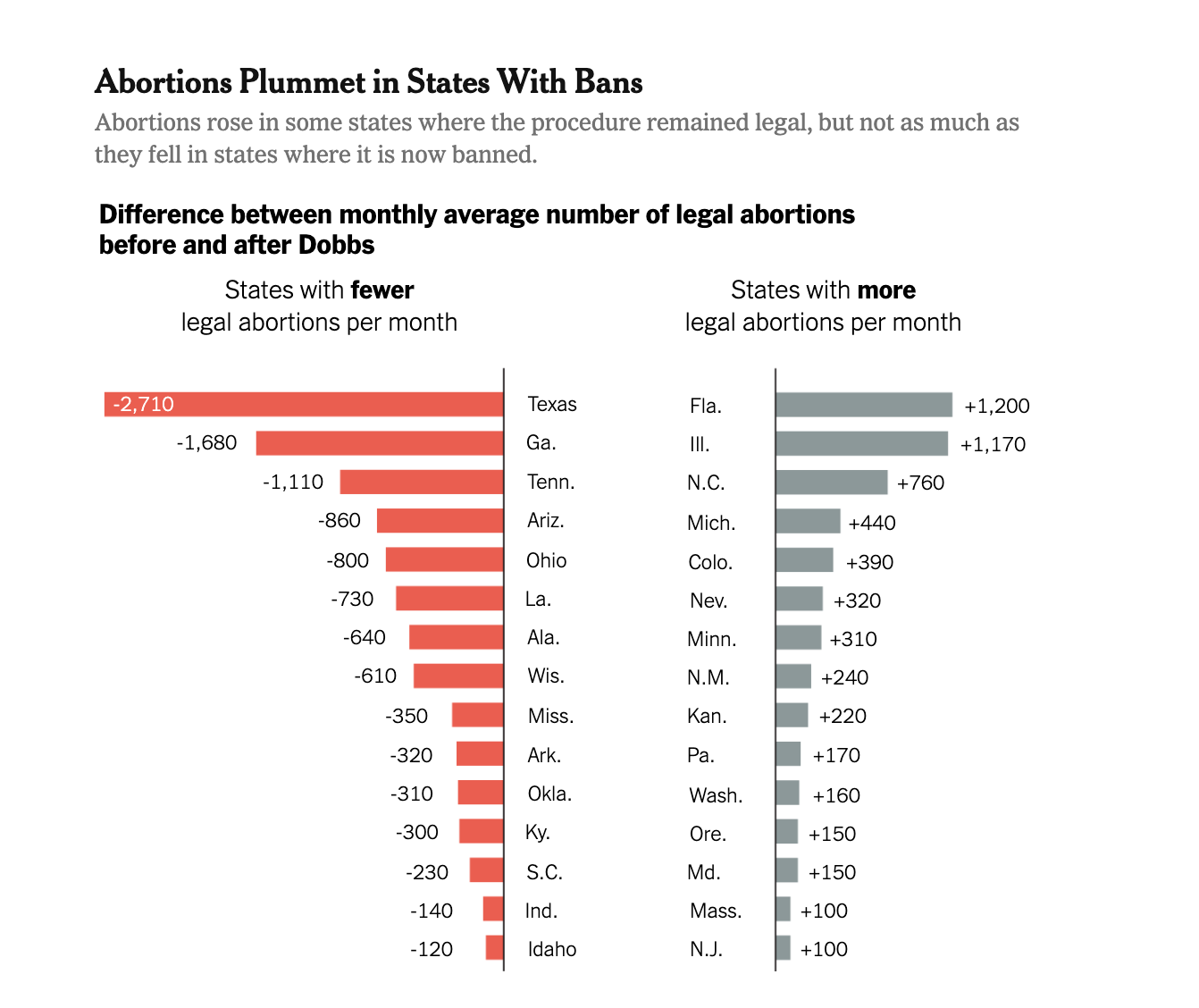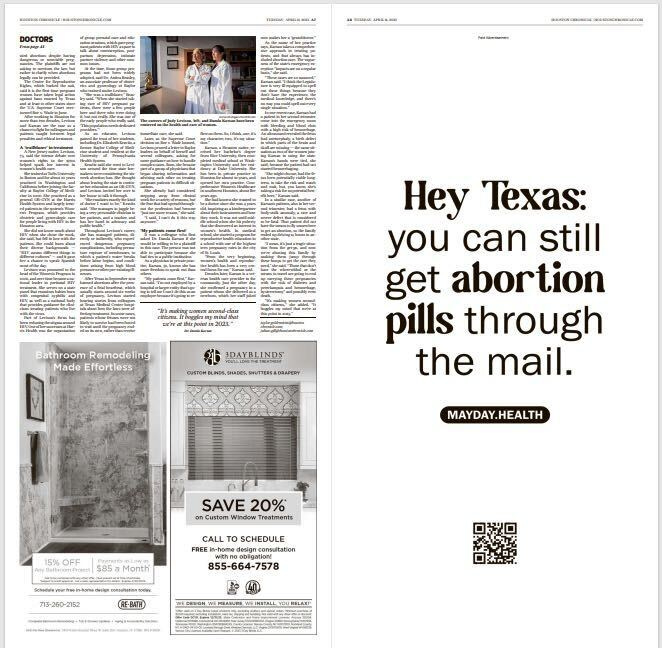In the states…
I wrote a little bit yesterday about leaders in New York and California deciding to stockpile misoprostol—the abortion medication that is not in danger—and why I found the move so frustrating. My guess is that these states are worried they don’t have the same legal protection as those that signed onto the Washington lawsuit—which is why they’re purchasing misoprostol instead of mifepristone. But as law professor Mary Ziegler points out in The New York Times today, this move could unintentionally reinforce the false anti-abortion claim that mifepristone isn’t safe:
“It’s premature to do that and it might frighten people unnecessarily. We’re in a climate where a lot of people don’t know what the law is.”
It’s a really important point. (Meanwhile, I was just angry that they were tweeting about their miso stockpile because it felt like they were taking a victory lap over nothing.)
Here’s a list of the 17 states (and DC) that the ruling out of Washington says can continue to dispense mifepristone: Washington, Oregon, Arizona, Colorado, Connecticut, Delaware, Illinois, Michigan, Nevada, New Mexico, Rhode Island, Vermont, District of Columbia, Hawaii, Maine, Maryland, Minnesota, Pennsylvania
Banning mifepristone wouldn’t just negatively impact abortion and miscarriage patients, but doctors—who have been totally overwhelmed post-Dobbs. Kelly Flynn, who operates several North Carolina abortion clinics, for example, said in a panel discussion that just that morning one clinic had twenty patients and that “every one of them chose mifepristone as their treatment.” Flynn and other abortion providers say that limiting mifepristone will lead to more surgical abortions, an increase doctors in the state may not be prepared to meet.
Lawmakers in Nebraska are debating a 6-week abortion ban today—legislation that could be amended to ban abortion at 12-weeks instead. (A change was suggested by a Republican legislator who obviously believes a 6-week restriction will be super unpopular.) Senator Megan Hunt tweeted that faith leaders in the state weren’t allowed to testify in opposition to the ban. She said, “The right to bodily autonomy is not incompatible with faith.”
I wrote on Monday about Iowa Attorney General Brenna Bird’s decision to stop paying for rape victims’ morning-after pills—a move as telling as it was cruel. Well, it looks like Bird’s decision is even more horrific than we originally thought (and it was already pretty fucking bad!). It turns out the state’s victim compensation fund that provides contraception to sexual violence victims mostly serves children. That’s right, she’s taking away the morning-after pill from raped children.
You probably remember that Lewis-Clark State College in Idaho removed a piece from an art show last month because they said the content violated the state’s law against using public funds that might “promote” abortion. One of the artists whose work was pulled, Lydia Nobles, has written an article about her experience and how she’s fighting back against these kinds of attacks on free speech. She says, “The censorship has only fueled my passion to use art to uplift individuals’ abortion stories and amplify barriers to abortion access.”
Quick hits:
The Seattle Times on the recently-passed law that will protect abortion providers and patients in Washington;
Eighteen conservative state Attorneys General have signed onto an amicus brief supporting Florida’s 15-week abortion ban, which is currently being challenged in the state Supreme Court;
Alabama Republicans are pushing legislation to allow pregnant women to get tax deductions for their fetuses (a move to establish personhood, not help families);
And it looks like the abortion rights legislation in Maine has all the votes it needs to pass.
In the nation…
Over two hundred members of Congress have signed onto an amicus brief urging an appeals court to block Judge Matthew Kacsmaryk’s ruling. The legislators argue that “the perils of this unwarranted judicial intervention into science-based determinations can hardly be overstated.” (Note: My work at Abortion, Every Day was cited in the brief.)
Meanwhile, the anti-abortion organization that brought the case against the FDA filed an argument last night asking the federal appeals court to let Kacsmaryk’s ruling stand. They write that his decision was “meticulously considered.” Sure it was! What’s also interesting is the group is trying to pretend as if this isn’t about banning abortion entirely. The filing says that Kacsmaryk’s ruling simply “removes mifepristone from the mails and the market,” and that abortion “will still be available in states that permit it.” The dishonesty never stops!
Democrats disagree about what to do in light of the mifepristone rulings—with the Biden administration arguing that ‘ignoring’ the ruling would set a poor precedent, while legal experts point out that allowing the FDA discretion over their enforcement policies isn’t unlawful in the least. Meanwhile, Republicans are making noise about defunding the FDA should they make a move they don’t like.
Since the rulings on mifepristone came out, there have been quite a few legal explainers published—here are a few that I found useful and accurate: Both Media Matters and The New York Times break down the (plentiful) anti-abortion language used in Kacsmaryk’s ruling; at CNN, law professors Mary Ziegler and Michele Goodwin get into the “junk science” behind the lawsuit; law professor Jessica Levinson writes at MSNBC about how the ruling could revive the Comstock Act; and Vox looks at the anti-abortion message (repeated by Kacsmaryk) that pro-choicers want to treat pregnancy “like a disease.”
Also, over at The Guardian, David S Cohen, Greer Donley and Rachel Rebouché, wrote about why the FDA should decline to enforce a mifepristone ban:
“Enforcement discretion allows the agency to provide safe harbor for technical violations of law. So even if mifepristone becomes an unapproved drug per the Texas order, the agency could announce that it would not pursue action against the entities that market or dispense the drug to maintain the status quo as required by the Washington case. This would not require the agency to ‘ignore’ the Texas order, as some have suggested. Rather, enforcement discretion is a normal part of the FDA’s operation and only relevant if the drug becomes unapproved as ordered.”
If you want to read more wisdom from Greer Donley and Rachel Rebouché, check out the interview Abortion, Every Day did with them after the mifepristone rulings.
Isaac Chotiner at The New Yorker has a terrific interview with Jody Steinauer, director of the Bixby Center for Global Reproductive Health about abortion medication, what it will mean to restrict mifepristone, and how OBGYN training has changed post-Dobbs. It’s on that last point that Steinauer has a lot to say:
“This is a national crisis in obstetrics and gynecology. We have to ask, ‘How can we make sure that those residents, in addition to every other resident, are trained to competence?’ If we can’t solve that problem, we’re all very worried that, for however many years these laws are in place, there will be a group of residents who are going to finish and not be able to be as competent in those skills as they could have been.”
Definitely take the time to read the whole interview. It’s this kind of nuanced expertise we need to hear more of right now.
Last bit of national news: The Biden administration is going to be updating HIPAA in order to protect abortion providers and patients. POLITICO reports that the change would prohibit health care insurers or providers from giving private health information to any law enforcement that’s going after abortion cases. While the Department for Health and Human Services already released guidance saying the same, the hope is that this would give doctors and insurers more confidence and protection. An unnamed official said, “We found that even with the permissible disclosures [policy], some providers get fearful when they receive a subpoena or they might feel like they have to turn the information over.”
Quick hits:
FiveThirtyEight with data showing that telehealth abortions increased quite a bit post-Dobbs;
A Los Angeles Times column makes clear that the end goal isn’t just banning abortion, but contraception;
At MSNBC, Dr. Esther Choo writes that the anti-abortion groups who brought the case against the FDA, claiming that mifepristone is unsafe, have no interest in a “better, safer drug regimen for abortion”;
And Stat News points out that the next big battle in abortion rights could be the conflicting laws between states.
2024 (yes, already)…
Potential Republican presidential candidates are already worried about abortion. (And they should be.) The Des Moines Register reports that Nikki Haley has been trying to court women voters with some very wishy washy language about abortion. Haley told an audience this week that while she is ‘pro-life’, she doesn’t “judge anyone who is pro-choice.” She also said that abortion “is a personal issue for women and for men,” and that “I don't want unelected judges deciding something this personal.” Haley also urged other Republicans not to “let this become a political football.”
Stats & studies…
Republicans have been tellingly silent since the rulings on mifepristone came out, and the anti-choice group Susan B. Anthony Pro-Life America would like us to think it’s because…they were at church. Yes, really. The organization’s state policy director, Katie Daniel, told Semafor, “Everyone was at church on Friday night when the decision came out….that could be part of it.” (The church of What the Fuck Have We Done.)
What seems a lot more likely is that Republicans are reading all of the polls showing the strong—and increasing—support for abortion rights, including this new Pew survey showing that 53% of Americans want abortion medication to be legal. Only 22% say it should be illegal. And by the way: This survey was taken before the two mifepristone rulings came out. I’m willing to bet that number would be even higher if conducted today.
Speaking of statistics, I wanted to flag a little more information from the new #WeCount data that I mentioned yesterday. First and most importantly: I should have noted that this data does not include abortion medication that was ordered from places like Aid Access or Mexican feminist groups. That means the rates of abortion in states with bans was likely higher. The New York Times has some good graphs (including this one below) showing the study’s results, for anyone interested:
The #WeCount research also shows that thousands of people seeking abortions had to travel long distances in order to obtain them. This is important not just in terms of understanding the financial and logistical barriers to care, but because of the emotional toll involved. A new study from Advancing New Standards in Reproductive Health (ANSIRH) at the University of California in San Francisco, shows that those who need to travel for abortions experienced stress, anxiety, and shame as a result.
Some patients had to disclose their abortion to those they wouldn’t otherwise have wanted to tell, for example—like their employers. One woman said the experience of having to share private medical information “just makes me feel violated.” Other patients were unaccustomed to traveling, and were afraid of being in a new place on their own without their support network. And, of course, there was a lot of shame reported over being unable to get abortion care in their home state. Some women were even worried that a doctor’s refusal meant that the procedure was dangerous.
The study is worth a read in its entirety (you don’t have to be a research person to get the gist)—it’s a good reminder that abortion bans cause more than just physical harm.
You love to see it…
The folks at Mayday Health took out a full page ad in the Houston Chronicle yesterday:
Listen to this episode with a 7-day free trial
Subscribe to Abortion, Every Day to listen to this post and get 7 days of free access to the full post archives.


















